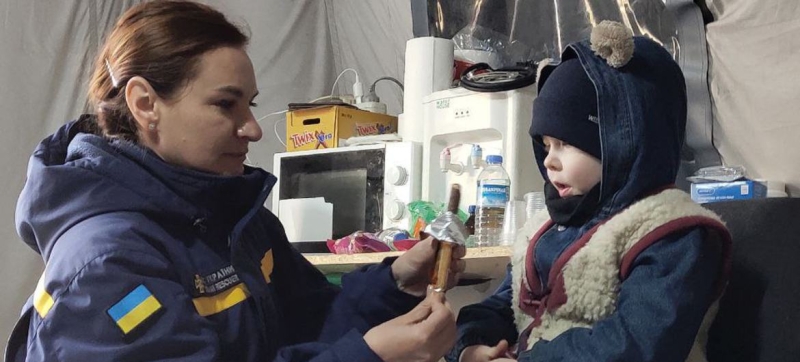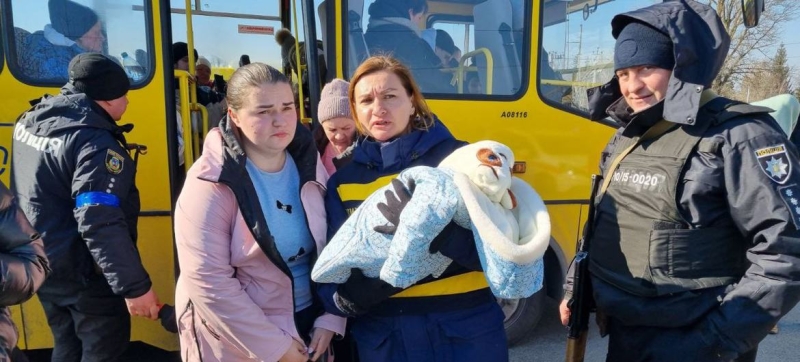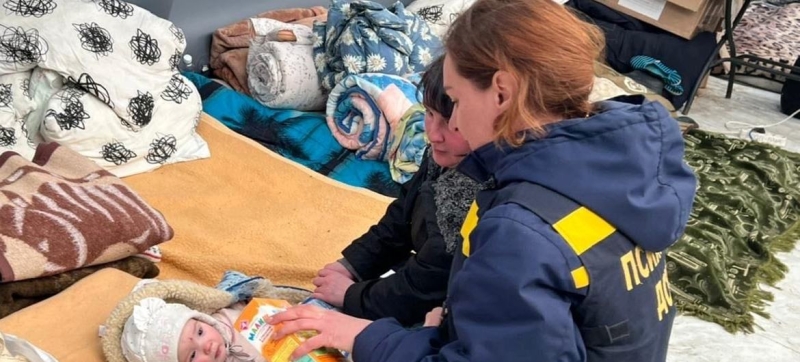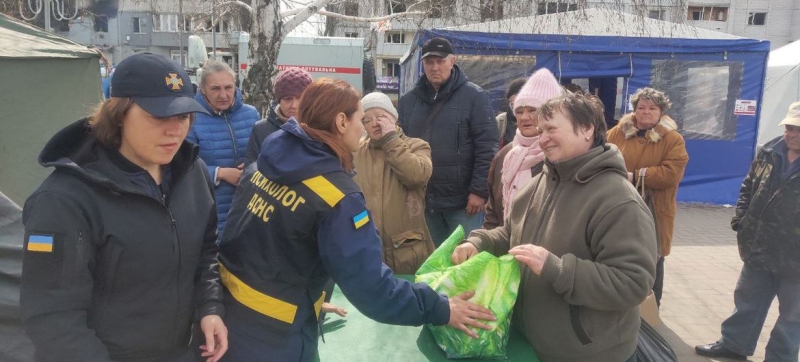
Displaced persons camp, Ukraine, March 2022 Psychologist Kateryna Gaidamachuk: “I believe that most Ukrainians will cope with the traumatic experience” Peace and security
Because of the war, every fourth person in Ukraine is at risk of serious mental disorders. This is the conclusion reached by experts from the World Health Organization (WHO). The loss of home, loved ones, stable income, forced migration, constant air raids, rocket attacks – all this, according to WHO experts, affects the psyche of people and, as a result, can lead to depression, anxiety disorder and post-traumatic stress disorder.
Since the first days of the full-scale Russian invasion, psychologists from the State Emergency Service have been helping people affected by the war. Their role is invaluable. They meet evacuation trains, work with those affected by shelling, helping Ukrainians to overcome their deep trauma. Expanding the professional knowledge of the SES psychologists is one of the tasks of the United Nations Development Program in Ukraine (UNDP): more than 50 specialists have completed special UNDP trainings, organized with financial support from Japan.
Katerina Gaidamachuk, senior psychologist at the Main Directorate of the State Emergency Service in the Kyiv region, has been helping people cope with psychological problems in emergency situations for 12 years: “Before that, I worked in a psychiatric clinic, but I decided to change my profile, and I really liked this work. On the one hand, you are connected with misfortune and grief, but on the other hand, when you feel your need, your usefulness, it gives you strength and you can share it further.”
Before the war, State Emergency Service psychologists were more involved with the personnel of the service – various rehabilitation programs, personnel selection, because rescuers must be stress-resistant people.
“There were plenty of disasters and emergencies in civilian life, too. Every day, some unit would go out to put out fires (and there are tragic cases, like building collapses). We, psychologists, also took part in the aftermath of emergencies involving loss of life. We had a clear scheme for providing first psychological aid, we were trained for it. We did it often, quite stereotypically, and knew exactly whose role was where,” says Katerina.
“We encountered what we were not taught…”
The war changed a lot. There are clear rules for providing first psychological aid, and it is very important not to deviate from them, explains Katerina: “The first is to ensure basic needs, the second is to maintain calm and instill self-confidence in the person, the third is breathing exercises and working with various reactions (for example, hysteria, panic, stupor). We clearly knew the algorithms of actions. But when the events of February 24, 2022 happened, we were faced with new activities for us, for example, evacuation. And we were not taught this. That morning, we were all gathered and told to act according to commands, but we did not know what commands … “
The full-scale Russian invasion came unexpectedly for Katerina, as it did for many other Ukrainian citizens. “We didn’t believe that this was possible in the 21st century, when the whole world was concerned about environmental issues, and suddenly – war. It was something out of science fiction. It couldn’t be!” the psychologist recalls. “I lived not far from one of our units, where two oil depots were located nearby. When the first explosions happened in the morning, I thought it was at one of them, and ran to the unit. Twenty minutes later, a general alert was announced (this meant that the entire staff needed to arrive at their places, and the doctors and psychologists – to the main office), I grabbed my emergency backpack and rushed to the train. Approaching Kyiv, I realized that panic was starting. The notification was sent out very quickly at the state level.”

Evacuated residents of the Bucha district of the Kyiv region are receiving medical and psychological assistance.
“We all worked as people first and foremost”
“We set up a tent camp in the village of Belogorodka (it is 2-3 km from Irpen, Bucha and Gostomel). Even before the “green corridors” began, people began to make their way to us from the occupied territories, to break through, and we met them. Our rescuers set up field kitchens, provided people with overnight accommodation. Then the authorities began to negotiate “green corridors”, bus routes were organized. People left during the day (by bus and personal cars), and at night they left the occupation on foot. They were shot at. Buses and cars were also fired upon. And then we no longer had time to learn about first aid. There we all worked first and foremost as people. We provided for the most basic needs – charged phones, called loved ones, relatives, looked for overnight accommodation for mothers with children.”
“The people you help often touch your soul”
Katerina lists those whose faces and names she remembers, who emotionally sunk into her soul: “A young mother with three children, the youngest is three days old, he was born in the occupation. They were taken along the “green corridor” by bus. We prepared a place in the tent so that the child could be changed and fed, because there were no normal conditions in the occupation. The baby didn’t have a name yet. His dad found out that he had a son only when the woman was able to reach him by phone after visiting us. And when soon dad came for his family, he took the baby in his arms, looked at him and confidently said – he will be Makar.”
“There were many people in the tent with us who were waiting for their loved ones. There was a family – a mother with two children from the Vinnytsia region. The kids were very tired, I felt sorry for them. And as soon as I said: “Oh, my God, when will they come for you?”, a car pulled up. A man got out of it, came up, hugged us (the medics, me) and thanked us. He turned out to be the priest of the monastery, and these children were his nephews, he had just come for them,” Katerina continues.
She also recalls a case when a woman in the tent camp went into labor: “We, to be honest, were very scared, it was one of the biggest stresses for us. Our medics got ready. The guys chopped wood to make a fire and heat water. Just like in the movies. They got out bandages, medicines – turned all the first aid kits inside out. They kicked everyone out of the tent. They prepared mattresses. And the woman changed her mind. These were practice contractions, the body decided to wait. And when the curfew ended, in the morning, we took her to the hospital, and there she gave birth. Everything ended well.”
Katerina also knows many sad stories, mostly about elderly people who were taken out of hospitals and residential buildings. Among them were old people with dementia, and it was almost impossible to find their relatives.
“You didn’t understand how to help them. Contact your loved ones? They couldn’t explain to you who they were. There was one grandfather who had a stroke. He didn’t speak, and we communicated with our eyes. Naturally, he had relatives, because someone had put him in the hospital. But there were a lot of shootouts, a lot of dead civilians. And although the police tried to find out something, they couldn’t find any of his relatives. Grandfather was then taken to the hospital. Unfortunately, he died,” the psychologist recalls.

Camp for internally displaced persons near Bucha, Ukraine, March 2022.
The war has morally exhausted psychologists
According to Katerina, the war has led to the moral exhaustion of psychologists. On the other hand, against the backdrop of military actions, there was a mobilization of resources.
“Many countries that had the same tragic experience began to share their knowledge with us. For example, Israel actively invites us to various trainings,” says the psychologist. “But this knowledge will probably never be enough, because we constantly encounter situations that happen for the first time in our lives. And the most important thing in them is not just not to get confused, but to show the person you are helping that you are strong and calm. It can be difficult later. But it is important to convince the person that it is partially safe around you.”
What to do in emergency situations
The psychologist says that it is impossible to prepare yourself for an emergency situation, that is why it is an emergency. Some people fall into a stupor, some panic – everyone reacts in their own way.
“There are well-known states in psychology – fight, run, freeze. People usually act according to one of these scenarios. There is no universal recipe. It is impossible to say – if you breathe like this and like that, you will feel better. A person who has a “freeze” reaction does not think about breathing at all. We cannot predict in advance how someone will react. If a person is conscious, then at such a moment he needs, as they say, to “ground himself”. This means understanding that you are in reality, standing on the ground, there are people around you, the sun, clouds. You need to fix your gaze on something, try to concentrate. Because only in a conscious state can we help ourselves. And, accordingly, we can help other people. This is important. And when a person is already conscious, it is advisable to inhale and exhale, if necessary, drink water in small sips, and begin to act.”
Action calms, directs and mobilizes
“Action calms, directs and mobilizes,” the psychologist explains. “For example, those people who are now far from Ukraine often feel even more anxious because they are observers. But those who are inside are able to make decisions and act. They are fueled by adrenaline, many things seem normal to them and do not frighten them. Their tone saves them. A similar effect occurs when people retire at a young age. This often causes them to physically decline. Because it is very important to be in the rhythm of life. The expression “movement is life” is exactly about this. You can always act – for example, help. I know many families who volunteer while in other countries. Therefore, it is possible to act even when you are far away.”
Everyone experiences war differently
As Katerina emphasizes, each person copes with the trauma caused by war and destruction in their own way, but most people have potential.
“Out of a hundred percent of people who have experienced traumatic events, only 25 percent will have consequences,” the psychologist believes. “Of course, I am generalizing now, we have not conducted any studies, this is from experience, including wars in other countries. Our brain has a colossal resource, it is very intelligent.”
“A quarter of people are inclined to the fact that they will need additional help, they will either get stuck in post-traumatic events or go into depressive states. The rest will mobilize, process it, leave it as an experience and will live productively,” she continues.
Post-traumatic syndrome is curable
But post-traumatic (PTSD) syndrome is also curable, says Katerina. PTSD is a complex disorder of mental activity, a set of reactions to trauma that affects both mental and physical health of a person.
“Insomnia, constant return to past events – a person lives in this state,” explains Katerina. “People who are stuck in such a situation cannot get out of it, because they did not finish it. Often people want to return to those events, it seems to them that they did not finish something, did not save someone. These are the emotions on which we get stuck, we must work through. The most correct decision in such a situation would be to contact a psychologist or psychotherapist.”

Distribution of aid among residents of Borodyanka.
You can’t tell someone: “Everything will be fine”
When providing psychological assistance, it is important not to harm, the psychologist points out.
“You can’t tell someone: “Everything will be fine.” Because you don’t know how it will be. If it is a stranger and you are providing first aid, you don’t know if he still has a place to live, what about his relatives. Working to eliminate the consequences of missile attacks, we never know what will happen in five minutes. Therefore, telling someone that everything will be fine is very difficult,” says Katerina.
“It’s better to tell the truth in measured doses. For example, it’s not very safe here, but for tonight it’s the best that can happen. As soon as morning comes, you can leave for a safer place,” she adds.
“Words have great power”
A person can not only seek professional help, but also try to help themselves independently – starting with mental hygiene. The most important thing is to improve sleep, Katerina emphasizes.
“Whoever you turn to, you will be asked about sleep and advised to improve it – go to bed and wake up at the same time. Don’t watch the news or anything bad before going to bed, or anything at all. Secondly, walks. If you have a pet, that’s good, you will be forced to walk in the morning and evening. But even if you don’t, you should find an opportunity to take walks. And thirdly, it’s support. I’m not talking about “chatting with friends.” There are people who, for example, have had a similar experience, and they don’t mind talking about it. You need to try not to close yourself off, because words have great power. Another great way is the warmth of loved ones and hugs. In general, hugging is a real method of psychotherapy,” the psychologist shares.
Even the morally strong are not ready for everything
“The rescuers themselves are morally strong people, we select them. But they are not ready for absolutely everything. Now they are constantly taking part in the liquidation of the consequences of missile attacks. Not everyone is ready to see the corpses of children. Sometimes the families of rescuers are not ready for their work – relatives do not agree with their heavy workload. Pyrotechnicians and sappers, for example, are never at home, they are on endless business trips, their families are probably the hardest. Now, unfortunately, there will be a lot of work for them for many years to come,” says Katerina.
Katerina’s own family treats her work with understanding.
“I don’t tell my mom and dad much, it’s very superficial and softened, and they themselves are strong people with a lot of life experience. And my son is also a rescuer. That’s why we understand each other, we discuss some things, and keep quiet about others,” the psychologist says.
“I believe that most Ukrainians will cope with the traumatic experience”
According to Katerina, who often sees how people, despite the horrors of war, smile and move on with their lives, most of the population of Ukraine will cope with this traumatic experience.
“We have one pyrotechnician with an amputated leg. His other leg was also on the verge of dying after the injury, but thanks to the doctors it was saved. We often talk to him, – says the psychologist. – This man speaks about life with incredible positivity. He told me: “Well, I can’t sew my leg back on. I have two children, and in any case I need to think about plans for the future. I’ll adapt if I get a prosthesis.” This ability to not get stuck in the past, to make plans for the future pulls people out of tragic events.”
“I tell everyone – make plans, even if your life has changed. It’s good when there is someone to take care of – it forces you to wake up in the morning and move. But even if you are alone, there are always those who need your help. They will always thank you, and that is what is important,” summed up Katerina.
